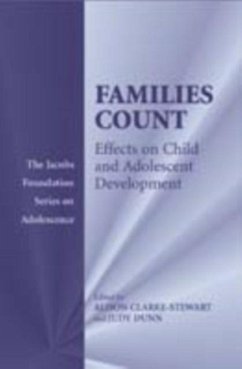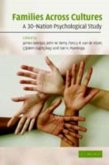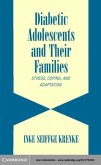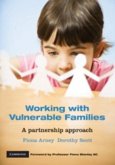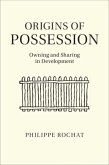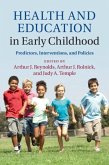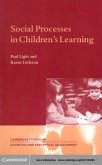Families Count (eBook, PDF)
Effects on Child and Adolescent Development
Redaktion: Clarke-Stewart, Alison


Alle Infos zum eBook verschenken

Families Count (eBook, PDF)
Effects on Child and Adolescent Development
Redaktion: Clarke-Stewart, Alison
- Format: PDF
- Merkliste
- Auf die Merkliste
- Bewerten Bewerten
- Teilen
- Produkt teilen
- Produkterinnerung
- Produkterinnerung

Hier können Sie sich einloggen

Bitte loggen Sie sich zunächst in Ihr Kundenkonto ein oder registrieren Sie sich bei bücher.de, um das eBook-Abo tolino select nutzen zu können.
This book is concerned with the question of how families matter in young people's development - a question of obvious interest and importance to a wide range of readers, which has serious policy implication. A series of key current topics concerning families are examined by the top international scholars in the field, including the key risks affecting children, individual differences in their resilience, links between families and peers, the connections between parental work and children's family lives, the impact of childcare, divorce, and parental separation, grandparents, and new family…mehr
- Geräte: PC
- mit Kopierschutz
- eBook Hilfe
- Größe: 1.99MB
- FamilySharing(5)
![Families Across Cultures (eBook, PDF) Families Across Cultures (eBook, PDF)]() Families Across Cultures (eBook, PDF)51,95 €
Families Across Cultures (eBook, PDF)51,95 €![Diabetic Adolescents and their Families (eBook, PDF) Diabetic Adolescents and their Families (eBook, PDF)]() Inge Seiffge-KrenkeDiabetic Adolescents and their Families (eBook, PDF)39,95 €
Inge Seiffge-KrenkeDiabetic Adolescents and their Families (eBook, PDF)39,95 €![Modern Families (eBook, PDF) Modern Families (eBook, PDF)]() Susan GolombokModern Families (eBook, PDF)24,95 €
Susan GolombokModern Families (eBook, PDF)24,95 €![Working with Vulnerable Families (eBook, PDF) Working with Vulnerable Families (eBook, PDF)]() Working with Vulnerable Families (eBook, PDF)52,95 €
Working with Vulnerable Families (eBook, PDF)52,95 €![Origins of Possession (eBook, PDF) Origins of Possession (eBook, PDF)]() Philippe RochatOrigins of Possession (eBook, PDF)29,95 €
Philippe RochatOrigins of Possession (eBook, PDF)29,95 €![Health and Education in Early Childhood (eBook, PDF) Health and Education in Early Childhood (eBook, PDF)]() Health and Education in Early Childhood (eBook, PDF)29,95 €
Health and Education in Early Childhood (eBook, PDF)29,95 €![Social Processes in Children's Learning (eBook, PDF) Social Processes in Children's Learning (eBook, PDF)]() Paul LightSocial Processes in Children's Learning (eBook, PDF)29,95 €
Paul LightSocial Processes in Children's Learning (eBook, PDF)29,95 €-
-
-
Dieser Download kann aus rechtlichen Gründen nur mit Rechnungsadresse in A, B, BG, CY, CZ, D, DK, EW, E, FIN, F, GR, HR, H, IRL, I, LT, L, LR, M, NL, PL, P, R, S, SLO, SK ausgeliefert werden.
- Produktdetails
- Verlag: Cambridge University Press
- Erscheinungstermin: 13. März 2006
- Englisch
- ISBN-13: 9780511166600
- Artikelnr.: 38205434
- Verlag: Cambridge University Press
- Erscheinungstermin: 13. März 2006
- Englisch
- ISBN-13: 9780511166600
- Artikelnr.: 38205434
- Herstellerkennzeichnung Die Herstellerinformationen sind derzeit nicht verfügbar.
Judy Dunn is a psychologist whose research is focused on children's social, emotional and communicative development. She has studied children's family relationships (she pioneered research on siblings) and friendships, stepfamilies, and children's understanding of other people with a particular interest in longitudinal naturalistic observation approaches. She began her research in Cambridge University, spent 8 years in the US, and is currently a professor at the Institute of Psychiatry in London. She is a fellow of the British Academy and of the Academy of Medical Sciences. She has received the Society for Research in Child Development's Award for Distinuished Scientific Contribution and the American Psychological Association's G. Stanley Hall Award. She has been a visiting scholar at the Center for Advanced Study in the Behavioral Sciences at Stanford University, the Van Leer Foundation in Jerusalem, and universities in Italy. She has written scholarly articles and books, including most recently Children's Friendships: The Beginnings of Intimacy (Blackwell Publications 2004).
development: reflections from research on risk and resilience Ann S. Masten
and Anne Shaffer; 2. The promotion of resilience in the face of adversity
Michael Rutter; 3. Identifying risk and protective factors for healthy
child development Arnold Sameroff; Part II. Peer and Parents: 4. The
influence of family and peer relationships in the development of competence
during adolescence W. Andrew Collins and Glenn I. Roisman; 5. Toward a
dynamic developmental model of the role of parents and peers in early onset
substance use Kenneth A. Dodge, Patrick S. Malone, Jennifer E. Lansford,
Shari Miller-Johnson, Gregory S. Pettit and John E. Bates; Part III. Work
and Family: 6. Mothers and fathers at work: implications for families and
children Ann C. Crouter; 7. The family-child care mesosystem Kathleen
McCartney; Part IV. Discord and Divorce: 8. Marital discord, divorce, and
children's well-being: results from a 20-year longitudinal study of two
generations Paul R. Amato; 9. The influence of conflict, marital problem
solving and parenting on children's adjustment in nondivorced, divorced,
and remarried families E. Mavis Hetherington; 10. Adolescents' development
in high-conflict and separated families: evidence from a German
longitudinal study Sabine Walper and Katharina Beckh; Part V. New and
Extended Family Forms: 11. New family forms Susan Golombok; 12.
Grandparents, grandchildren, and family change in contemporary Britain Judy
Dunn, Emma Fergusson and Barbara Maughan; Part VI. Conclusions and
Commentaries: 13. What have we learned: proof that families matter,
prospects for future research, and policies for families and children
Alison Clarke-Stewart; 14. Research and policy: second looks at views of
development, families, and communities and at translations into practice
Jacqueline J. Goodnow; 15. Prognosis: policy and process Robert A. Hinde.
development: reflections from research on risk and resilience Ann S. Masten
and Anne Shaffer; 2. The promotion of resilience in the face of adversity
Michael Rutter; 3. Identifying risk and protective factors for healthy
child development Arnold Sameroff; Part II. Peer and Parents: 4. The
influence of family and peer relationships in the development of competence
during adolescence W. Andrew Collins and Glenn I. Roisman; 5. Toward a
dynamic developmental model of the role of parents and peers in early onset
substance use Kenneth A. Dodge, Patrick S. Malone, Jennifer E. Lansford,
Shari Miller-Johnson, Gregory S. Pettit and John E. Bates; Part III. Work
and Family: 6. Mothers and fathers at work: implications for families and
children Ann C. Crouter; 7. The family-child care mesosystem Kathleen
McCartney; Part IV. Discord and Divorce: 8. Marital discord, divorce, and
children's well-being: results from a 20-year longitudinal study of two
generations Paul R. Amato; 9. The influence of conflict, marital problem
solving and parenting on children's adjustment in nondivorced, divorced,
and remarried families E. Mavis Hetherington; 10. Adolescents' development
in high-conflict and separated families: evidence from a German
longitudinal study Sabine Walper and Katharina Beckh; Part V. New and
Extended Family Forms: 11. New family forms Susan Golombok; 12.
Grandparents, grandchildren, and family change in contemporary Britain Judy
Dunn, Emma Fergusson and Barbara Maughan; Part VI. Conclusions and
Commentaries: 13. What have we learned: proof that families matter,
prospects for future research, and policies for families and children
Alison Clarke-Stewart; 14. Research and policy: second looks at views of
development, families, and communities and at translations into practice
Jacqueline J. Goodnow; 15. Prognosis: policy and process Robert A. Hinde.
